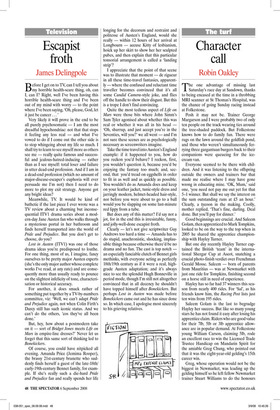Escapist froth
James Delingpole
Before I get on to TV, can I tell you about my horrible health-scare thing, oh, can I, can I? Right, well I’ve been having this horrible health-scare thing and I’ve been out of my mind with worry — to the point where I’ve been saying, ‘Oh, please, God, let it just be cancer ... ’ Very likely it will prove in the end to be all purely psychosomatic — I am the most dreadful hypochondriac: not that that stops it feeling any less real — and what I’ve vowed to do if I come out the other side is to stop whingeing about my life so much. I shall try to learn to see myself more as others see me — really quite famous and successful and jealous-hatred-inducing — rather than as I see myself: total loser and failure in utter dead-end profession. And if I am in a dead-end profession (which no amount of major-disease-escaper’s euphoria will ever persuade me I’m not) then I need to do more to plot my exit strategy. Anyone got any bright ideas?
Meanwhile, TV. It would be kind of bathetic if the last piece I ever wrote was a TV review about a charming but inconsequential ITV1 drama series about a modern-day Jane Austen fan who walks through a mysterious portal in her bathroom and finds herself transported into the world of Pride and Prejudice. But you don’t get to choose, do you?
Lost in Austen (ITV1) was one of those drama ideas you’re predisposed to loathe. For one thing, most of us, I imagine, fancy ourselves to be pretty major Austen experts (she’s the only major author whose complete works I’ve read, at any rate) and are consequently more than usually ready to pounce on the slightest infelicity of tone, characterisation or historical accuracy.
For another, it does smack rather of something put together by a TV-by-numbers committee, viz: ‘Well, we can’t adapt Pride and Prejudice again, not when Colin Firth’s Darcy still has such iconic status. And we can’t do the others, ’cos they’ve all been done.’ But, hey, how about a postmodern take on it — sort of Bridget Jones meets Life on Mars in empire-line dresses?’ Never let us forget that this same sort of thinking led to Bonekickers.
Of course, you could have nitpicked all evening. Amanda Price (Jemima Rooper), the brassy 21st-century brunette who suddenly finds herself a guest of the late-18th/ early-19th-century Bennet family, for example. If she’s really such a die-hard Pride and Prejudice fan and really spends her life longing for the decorum and restraint and politesse of Austen’s England, would she really — within 12 hours of her arrival at Longbourn — accuse Kitty of lesbianism, hoick up her skirt to show her her sculpted pubes, and then explain that this particular tonsorial arrangement is called a ‘landing strip’?
I appreciate that the point of that scene was to illustrate that moment — de rigueur in all these time-travel fantasies, apparently — where the confused and reluctant time traveller becomes convinced that it’s all some Candid Camera-style joke, and flies off the handle to show their disgust. But this is a trope I don’t find convincing.
Quite the most tedious aspect of Life on Mars were those bits where John Simm’s Sam Tyler agonised about whether this was real or whether it was all in his head — ‘Oh, shurrup, and just accept you’re in the Seventies, will you?’ we all went — and I’m not sure these scenes are as psychologically necessary as screenwriters imagine.
Take the time travel into Austen’s England example: if it happened to you, how do you reckon you’d behave? I reckon, first, you wouldn’t question it, because you’d be enjoying the fantasy too much; and, second, that you’d tread on eggshells in order to fit in as well and as quickly as possible. You wouldn’t do as Amanda does and keep on your leather jacket, tunic-style dress and jarringly modern, helmet-headed hair-style, nor before you were about to go to a ball would you be slapping on some last-minute red lippy from a tube.
But does any of this matter? I’d say not a jot, for in the end this is irresistable, funny, and jolly-well-done escapist froth.
Clearly — let’s not give scriptwriter Guy Andrews too hard a time — Amanda has to do stupid, anachronistic, shocking, implausible things because otherwise there’d be no drama and no fun. The cast is top notch — an especially fanciable clutch of Bennet girls methinks, with everyone acting as perfectly 18th/19th century as if it were a real, highgrade Austen adaptation; and it’s always nice to see the splendid Hugh Bonneville in period mode, though I’m still not altogether convinced that in all decency he shouldn’t have topped himself after Bonekickers. But perhaps Lost in Austen was made before Bonekickers came out and he has since done so. In which case, I apologise most sincerely to his grieving relatives.


































































 Previous page
Previous page